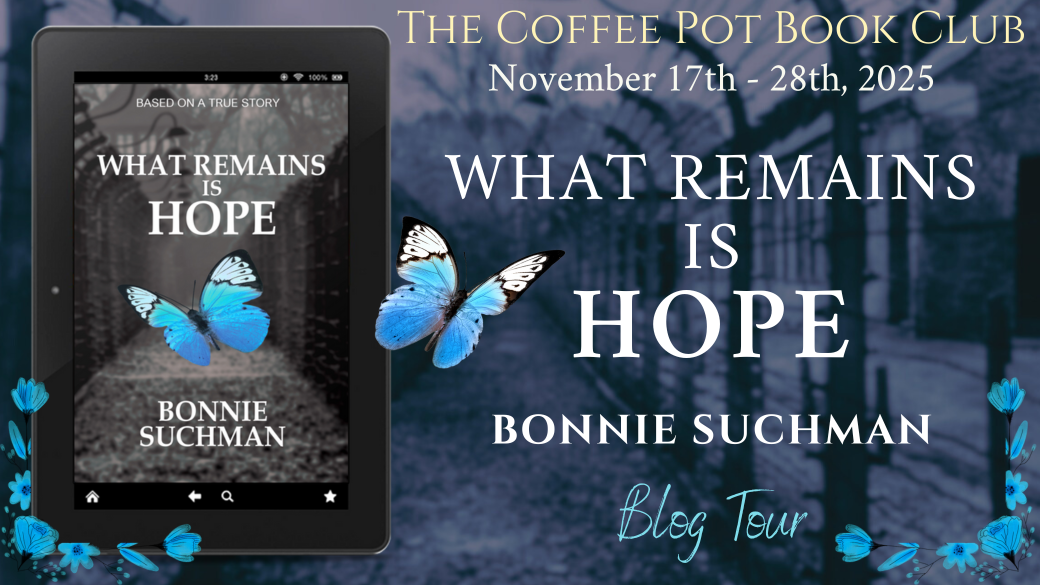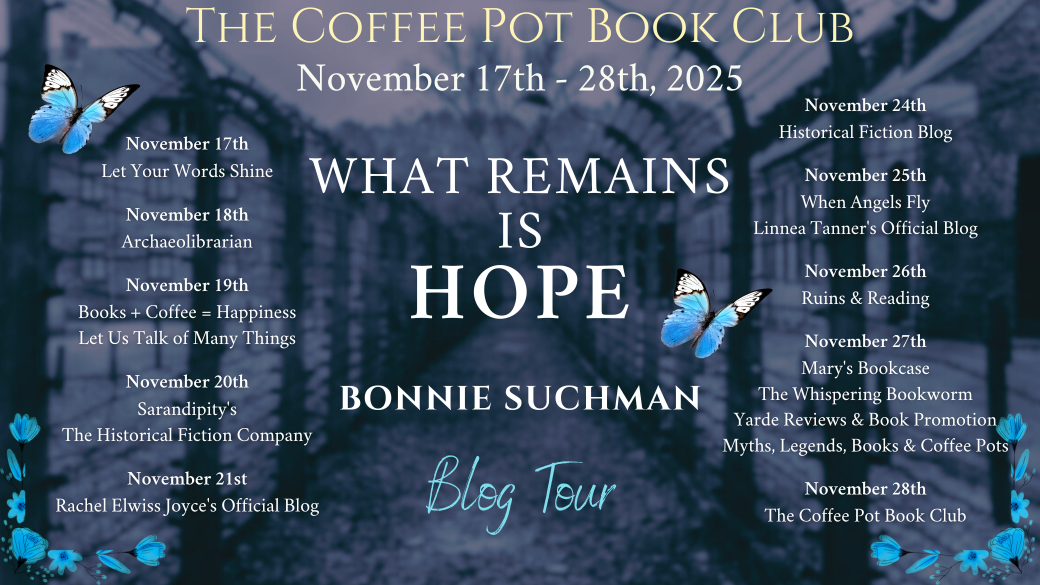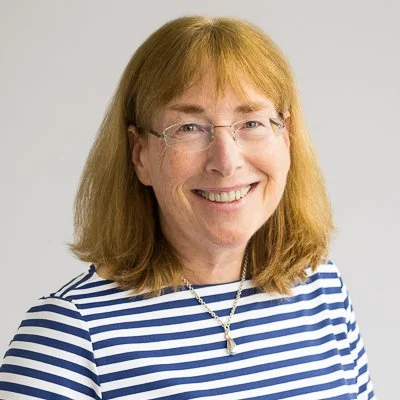What Remains is Hope by Bonnie Suchman
The Coffee Pot Book Club Blog Tour
What Remains is Hope by Bonnie Suchman
Today’s Coffee Pot Blog Tour features What Remains is Hope, a Holocaust saga. I’m providing an excerpt (see below), but first, take a look at the book description:
Beginning in 1930s Germany and based on their real lives, four cousins as close as siblings—Bettina, Trudi, Gustav, and Gertrud—share the experiences of the young, including first loves, marriages, and children.
Bettina, the oldest, struggles to help her parents with their failing business. Trudi dresses in the latest fashions and tries to make everything look beautiful. Gustav is an artist at heart and hopes to one day open a tailoring shop. Gertrud, the youngest, is forced by her parents to keep secrets, but that doesn’t stop her from chasing boys. However, over their seemingly ordinary lives hangs one critical truth—they’re Jewish—putting them increasingly at risk.
When World War II breaks out, the four are still in Germany or German-occupied lands, unable or unwilling to leave. How will these cousins avoid the horrors of the Nazi regime, a regime that wants them dead? Will they be able to avoid the deportations and concentration camps that have claimed their fellow Jews? Danger is their constant companion, and it will take hope and more to survive.
Praise for What Remains is Hope:
"Readers will find this follow up to Suchman's prior novel, Stumbling Stones, both a heartbreaking reminder of the Holocaust's atrocities and a compelling tribute to a family's refusal to surrender to despair...Richly compelling Holocaust account, centered on the power of hope."
~ Booklife by Publishers Weekly
"Author Bonnie Suchman has a way of making every moment count with her characters in a narrative that feels powerfully real as she spins deeply personal stories against a sweeping and tragic backdrop of history. ..What Remains is Hope is historical fiction at its best, and I'd highly recommend it to fans of gripping fiction that's emotionally resonant and grounded in truth."
~ K.C. Finn for Readers’ Favorite
Universal Buy Link: https://books2read.com/u/mvJNLV
The book is available to read on #KindleUnlimited.
The Excerpt (Number 4 if you’re following the tour):
Frankfurt, September 1935
Gertrud’s singing lesson went longer than she had wanted, and she was already running late to meet her father. Her teacher was frustrated with her progress and had even suggested that Gertrud might consider stopping the lessons. It had been her mother’s idea to take the lessons in the first place, thinking that her only daughter could grow up to be an opera singer. But Gertrud didn’t enjoy the lessons, and not just because of her teacher’s criticisms. She felt distracted and she was worried, mostly about her father. She understood it was getting harder to be a Jew in Germany. He never spoke with her about that, but she knew. He had stopped talking with Gertrud about his political activities, but she suspected he was still involved with the Socialist Workers Party, and she worried that he might be arrested one day. She decided she would say something to him at the café.
As she approached the café, she saw her mother sitting at an outdoor table. Her father had always insisted that they meet indoors and in the back (just in case someone she knew walked by), so why was her mother there and sitting outside?
“Mama, why are you here? I know I’m a little late, but you aren’t supposed to be here for another hour. Is Papa inside?”
“Gertrud, let’s go inside.”
Gertrud looked at her mother and saw fear in her eyes. She had never seen that look before, and it rattled her. She followed her mother to the back of the café, sat down, and asked, “Mama, what’s wrong?”
“I need to talk to you about two things. First, I need to tell you something about your Papa. I don’t know why, but he was always involved in political organizations. He always talked about helping the workers, but I never saw the point of any of his involvements. He should have thought about just one worker, himself. And I didn’t know that he was involved with the Socialist Workers Party, which has been banned by the government. I hope he never spoke to you about this.”
Gertrud lied. “No, he didn’t.”
“Well, that’s good. Anyway, he came to see me at work today and told me he had to leave Frankfurt right away, that the police were looking for him.”
“The police? Oh, no. Where is Papa now?”
“Your Papa left. He packed his bags and took a train to Prague. He told me there are Party members living in Prague and they’ll find him a place to live and maybe a job. I can’t believe how irresponsible he has been. That is just like him, worrying about the workers and not himself or his family! I told him to stop this nonsense when we were married, and I warned him not to start again when he moved back to Frankfurt from Strasbourg. He didn’t listen to me when we were married, and he clearly didn’t listen to me when he came back. He’s paying dearly for such recklessness by being forced to leave Germany.”
“Slow down, Mama. Papa has already left? He is in Prague?”
“Gertrud, pay attention. That’s what I’ve been telling you. Your father had to leave Frankfurt and is on his way to Prague. He should be there soon. He promised he would send a telegram once he arrives in Prague. Of course, using a different surname, in case Karl sees the telegram. Or the Gestapo.”
“I can’t believe this. He didn’t even say goodbye.”
“Believe me, Gertrud, he had no time to say goodbye. He couldn’t go to your school – you know why. And he couldn’t wait until this evening, since he might have been arrested. He did the right thing for once and left when he did.”
Gertrud was devastated - and heartbroken. But she knew that her mother would not want to see any tears for her father. She took a deep breath and told herself she would cry later. Then she remembered. “Mama, what’s the other thing you wanted to talk with me about?”
“Oh, yes, the other thing. You’ve probably not been paying attention to the morning papers – why would you? The Nazi Party has been meeting in Nuremberg, like they do every year, but this year they issued new laws relating to Jews. They’re now defining half-Jews as those with two Jewish grandparents, and you have two Jewish grandparents.”
Gertrud had been picking at a fingernail, like she usually did when someone was discussing politics, but as soon as she heard that last part of what her mother had said to her, she looked directly at her mother. “I don’t understand. What does that mean?”
“Your father’s parents were both Jewish. According to the Nuremberg Laws, you are half-Jewish.”
“But I still don’t know what that means!”
“According to the newspapers, it means that, for the most part, you will be treated by the government as a Jew.”
“But I’m not a Jew. I’m Lutheran. I’ve been baptized. Can’t you just explain to the authorities that I’m not Jewish?”
“Unfortunately, it doesn’t work that way. That’s now the law. And we now have another problem. Before I enrolled you in your new school, I needed to provide them with a birth certificate. Remember I told you that you would be using my maiden name as your surname in your new school, so that no one would know about your father? In order to enroll you in that school under the name ‘Auelmann,’ I needed to change your birth certificate and your baptismal record.”
“You changed my records?”
“I had to.”
Gertrud shook her head several times to try to clear the noise. Finally, she said, “So, let me understand what you’re saying. I am Jewish, my records are fake, and we have committed crimes by using them.”
“Well, actually, I think only I have committed a crime. Although, they might also charge you with committing a crime. But it doesn’t matter, since no one will know. As far as anyone knows, I gave birth to you out of wedlock, I don’t know who the father is, and your surname has always been Auelmann.”
“Wait! So, I’m also a bastard?”
“I thought you knew this last part. Why else would I tell you to use my surname when you started the new school? What have you been telling everyone?”
“I told them that my father died.”
“Well, you need to stop that. If anyone asks me, I’ll just say I told you your father died so you wouldn’t know you were born out of wedlock. That’s what I told Karl when we first met. Although, fortunately, he’s never seemed to be that interested.”
“Oh, all these lies! Mama, I can’t sit here anymore. I need to take a walk by myself. I will just meet you at home.”
Author Bio:
Bonnie Suchman Author
Bonnie Suchman has been a practicing attorney for forty years. Using her legal skills, she researched her husband's 250-year family history in Germany, publishing the award-winning, non-fiction book, Broken Promises: The Story of a Jewish Family in Germany, as a result.
Those compelling stories became Suchman's Heppenheimer Family Holocaust Saga. The first in the series, Stumbling Stones, was a Finalist for the 2024 Hawthorne Prize for Fiction, and recently, her family traveled to Frankfurt, Germany, to install stumbling stones for her husband's Great Aunt Alice and her husband Alfred, the real-life characters in the book.
What Remains is Hope is the second novel in the saga. In her free time, Bonnie is a runner and a golfer. She and her husband reside in Potomac, Maryland.
Author Links:
Website: www.bonniesuchman.com
Twitter / X: https://twitter.com/BonnieSuchman
Facebook: https://www.facebook.com/profile.php?id=61556457672565
Instagram: https://www.instagram.com/bonniesuchmanauthor/
Pinterest: https://www.pinterest.fr/bonniesuchman/
Book Bub: https://www.bookbub.com/authors/bonnie-suchman
TikTok: https://www.tiktok.com/@bonniesuchmanauth
Amazon Author Page: https://www.amazon.com/stores/Bonnie-Suchman/author/B09L3BDVRQ
Goodreads: https://www.goodreads.com/book/show/236761983-what-remains-is-hope


